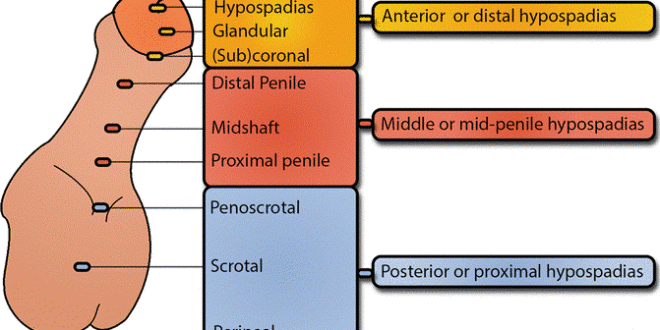What is hypospadias?
Hypospadias is a common condition that affects the penis in approximately 1 out of 200 boys.
The penis discharges urine and sperm out of the body via a tube called the urethra. The opening of the urethra is called the meatus, which is located at the glans, or the head, of the penis.
In hypospadias, the meatus (opening) is dislocated from near the tip of the glans (head) to the underside. The meatus is most commonly found on the distal end of the penis; however, it is not uncommon to find the meatus even within the scrotum.
According to a study reported in the European Journal of Pediatrics, 70% of the reported cases are those of the urethral meatus situated distally on the penile shaft. This form of hypospadias does not entail any other urogenital deformities. The remaining 30% of the cases are proximally located and are more complex.
The word hypospadias hails from Latin with “hypo” meaning under and “spade” meaning opening.
What causes hypospadias?
Hypospadias is a possible outcome of hormone imbalances between the 9th and 12th weeks of pregnancy, i.e., the period when the penis starts forming in the embryo as a result of hormonal signals.
According to the CDC, certain factors affect the risk of having a child with hypospadias. These include:
- Mothers who are over 35 and overweight have a higher risk of having a baby with hypospadias.
- Women who seek fertility treatments are at a higher risk of having a baby with hypospadias.
- Women who have a history of taking certain hormones before or during pregnancy carry a higher risk of having a baby with hypospadias.
How to diagnose hypospadias?
Hypospadias is diagnosed at birth. The dislocation of the meatus, as well as the appearance of the foreskin, are the first indicators of the condition. The tip of the penis is typically exposed due to the formation of a dorsal hood as the foreskin on the underside is incompletely formed.
Cases may vary, however. Some boys may report with a normally located meatus, but abnormal foreskin, whereas others may present with complete foreskin and an abnormally placed meatus.
A rare few with the condition also report with undescended testicles, i.e., testicles that have not entirely dropped into the scrotum.
How to treat hypospadias?
Hypospadias can be rectified with the help of surgery. The surgery aims to create a normal and straight penis with a urinary tract that ends at or near the tip of the penis.
The surgery involves a few steps, as follows:
- Creating a complete tube or urethra that extends to the end of the penis
- Moving the meatus to the end of the penis
- Straightening the shaft of the penis in case, it is curved, such as in chordee
- Circumcising, or removing, any abnormally formed foreskin on the penis
The process takes between one and a half to three hours. In some cases, such as that of severe chordee, the process may be completed in stages.
Often a urinary catheter is placed in the urethra for a few days after the surgery to ensure that the urine does not come into contact with the hypospadias repair.
The hypospadias surgery is generally done between the ages of 6 months to 1 year; however, the surgery can be performed at any age, even in adulthood.
What are the complications associated with the treatment?
The most commonly reported problem following hypospadias surgery is the formation of a fistula, or hole, in another location on the penis. This new path connecting the urethra to the skin can be a severe issue. Scars may also develop that hinder urine discharge.
If your child complains of a slow urinary stream or leakage from another hole, consult your doctor immediately.
Complications generally arise a few months following surgery. Problems are most commonly reported after proximal corrections. When it comes to fistulas, however, they may not get diagnosed for years. These complications can be rectified with the help of surgery, however.
How long is the healing period?
Complete healing may take up to months. The process entails slight bruising and swelling in the earlier days as well, which is normal.
Can hypospadias be inherited?
Hypospadias does reflect some genetic linkage. Every 7 out of 100 hypospadias cases are of those in which the father also had it. The chance that the second son may have the condition is approximately 12 out of 100.
If both the parent and the sibling have the condition, then the chances that the second son might have the condition rises to 21 out of 100.
Is surgery necessary?
A question often raised in regards to hypospadias is whether fixing the issue is necessary, especially for milder forms of hypospadias.
Regardless of how severe the condition is, surgical rectification is always recommended because it is difficult to predict any further issues that may arise in the future due to it.
The abnormal formations associated with hypospadias can affect the urine stream and cause discomfort as well.
These problems may also evolve into a source of embarrassment for the child as he ages. Various studies on uncorrected hypospadias report lower self-esteem in boys due to abnormal-looking foreskin.
For those with hypospadias and chordee (a condition characterized by a penis that curves downwards), problems may arise for him to acquire an effective erection in adulthood.
The benefits of correction outweigh the risks; therefore, it is recommended to resolve the matter as soon as possible.
What is the best option in terms of repair?
There is no better or worse way to repair hypospadias. Multiple techniques are employed to correct it. The method of choice depends on several factors, including the degree of hypospadias as well as the curvature of the penis. Whatever works best for the patient’s individual condition is used in the end.
Alycia Gordan is a freelance writer who loves to read and write articles on healthcare technology, fitness and lifestyle. She is a tech junkie and divides her time between travel and writing. You can find her on Twitter: @meetalycia









